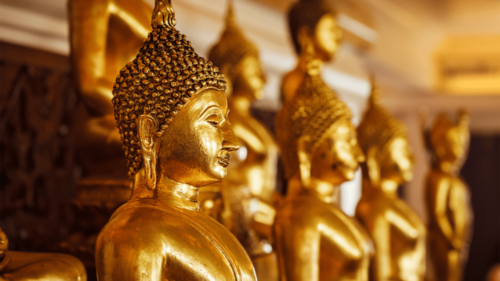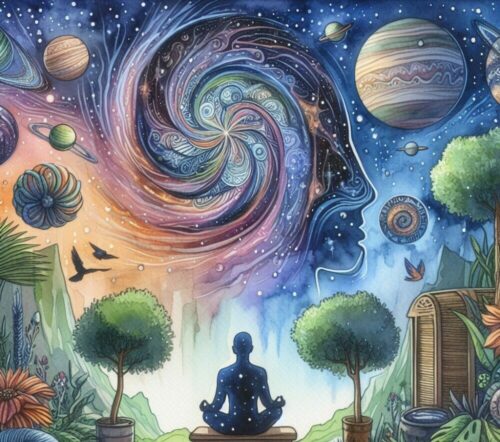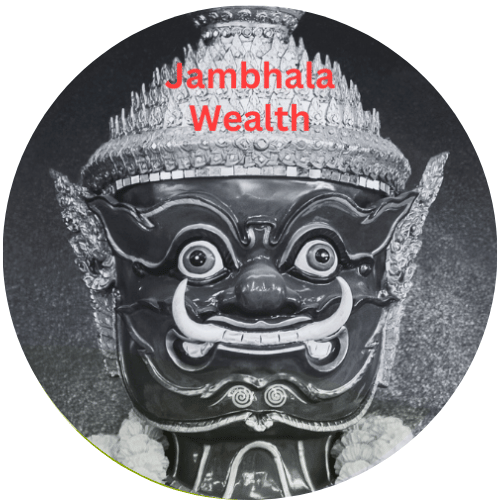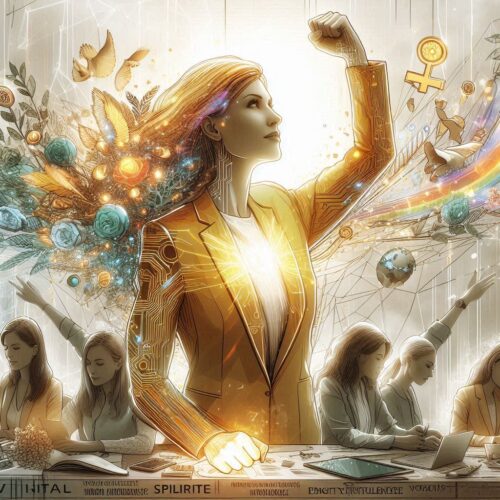
Rituals have always held a special place in human society.
Consider ancient times when people gathered around bonfires, chanting and dancing to please the gods.
These rituals weren’t just random acts.
They played a crucial role in bringing communities together, offering a sense of belonging and shared purpose.
Rituals marked essential life transitions from birth to death and helped people understand the unknown.
Throughout history, rituals have served not just spiritual roles but also psychological benefits.
Whether simple or complex, engaging in a ritual can provide a comforting routine, especially in uncertain times.
For example, lighting a candle before starting a big task might seem small, but it can offer a sense of calm and focus.
Through rituals, individuals can anchor themselves, creating a bubble of certainty in an unpredictable world.
But rituals aren’t static—they have evolved.
The way we practice and interpret these traditions has changed over the centuries.
While some rituals have faded away, many have adapted, blending elements from various cultures and adopting modern twists to stay relevant.
An example is the fusion of ancient meditation practices with modern mindfulness exercises, creating an accessible ritual for today’s busy lifestyle.
As new generations encounter challenges, they reshape rituals to fit their unique needs and contexts.
These days, we continue to see the power of rituals, even as they adapt to new cultural and technological landscapes.
Whether through traditional ceremonies or the latest Instagram trend of expressing gratitude daily, rituals remain a vital part of life, helping individuals and communities connect with something greater than themselves.

Understanding the Concept of Fortune in Different Cultures
The notion of fortune is slippery, mainly because it morphs and shifts depending on where you are.
Each culture brings its unique flavour to what it means to be ‘fortunate’.
For some, it’s about prosperity and abundance; for others, it’s closely tied to fate and destiny.
These differences showcase the rich tapestry of human belief and the myriad ways people seek to improve their lives.
Cultural stories and legends often highlight how people perceive luck and prosperity.
- Chinese New Year traditions are loaded with symbols of wealth and good fortune, like the red envelopes of money known as ‘hongbao’.
- In Irish folklore, luck is often associated with leprechauns and four-leaf clovers.
- In parts of Africa, tying elaborate beadwork often carries the intention of attracting wealth.
- Japanese traditions like the waving cat, or ‘maneki-neko’, serve as talismans for business prosperity, encapsulating hope for brighter days.
Exploring these diverse cultural perspectives can broaden our understanding of what it means to be lucky.
It also shows that there’s no one-size-fits-all approach to attracting fortune.
As you learn about these customs, you might find inspiration to incorporate pieces into your own life.
Perhaps it’s adopting a ritual from another culture or simply appreciating your unique journey.
Regarding fortune, it’s not just about what you have but about tapping into the collective human experience, sharing hopes and dreams, and perhaps finding your own path to a fulfilling life.
Experiment with different ideas and symbols worldwide until you discover what resonates with you.
Modern Unconventional Rituals: Bridging Tradition with Novelty
In today’s world, the line between tradition and modernity blurs, ushering in a wave of creative, unconventional rituals designed to attract fortune.
These aren’t your grandma’s rituals, yet they hold the same pull for a new generation looking to infuse their lives with purpose and positivity.
- Consider the rise of vision boards—collages of images and affirmations committed to manifesting one’s goals. Rooted in the modern law of attraction, these boards have become a tangible ritual for dreaming big and achieving success. With social media amplifying this practice, communities of people share their boards online, collectively engaging in hope-fueled aspirations.
- Then there’s the practice of ‘smudging’, traditionally used by Indigenous cultures, gaining popularity for its purifying and luck-enhancing qualities. This ritual involves burning sage to clear energy, adapted now as a common practice in many homes to usher in positivity and new opportunities.
- The digital sphere offers its own set of rituals, too. For instance, daily gratitude posts have become a part of some people’s routine, where followers participate in a daily reflection of gratitude meant to shift their mindset and invite good fortune. This online engagement fosters a sense of community while strengthening personal intentions.
Mixing traditional elements with personal preferences allows for flexible rituals that keep pace with changing lifestyles.
You could light a candle, say a mantra, or even jot down daily affirmations.
When combined with new-age beliefs or self-help techniques, these actions create a potent tool for shaping how we perceive and attract fortune.
These modern rituals, adapted and shared globally, highlight a universal desire to feel good and live meaningfully.
Mixing bits of tradition with a dash of creativity allows anyone to design rituals that attract fortune and nurture a sense of hope and fulfilment.

Scientific Perspectives: Does Luck Really Exist?
What’s the deal with luck?
Science offers exciting insights into this elusive concept, challenging our traditional views on fortune and chance.
Various studies have been conducted to unravel the mystery of luck.
Many researchers argue that luck is more about perspective than actual random occurrences.
Essentially, it’s about how individuals interpret situations and outcomes.
Those who consider themselves lucky often focus on the positives, find opportunities in setbacks, and are open to seizing unexpected chance experiences.
Psychologists like Richard Wiseman have explored the psychology behind luck.
According to his findings, people can ‘create’ their own luck through a positive mindset and proactive behaviours.
Traits such as resilience, optimism, and social connection contribute significantly to how fortunate someone feels and appears.
There’s also the concept of ‘the luck factor’, which involves leveraging certain behaviours and attitudes to increase perceived opportunities.
For instance, being open-minded and attentive can lead to recognizing more opportunities, while being social often leads to connections that might present unforeseen benefits.
While some might attribute fortune to cosmic forces or destiny, experts assert it’s often the product of a series of decisions and attitudes. The brain’s tendency to detect and remember positive results over negative ones adds to the illusion of being lucky.
Ultimately, whether or not an individual believes in luck, these scientific explorations suggest that a positive approach and active engagement in life’s opportunities can significantly affect one’s fortune experience.
Embracing this mindset can empower anyone to create their own luck, bridging the gap between belief and reality.

Practical Tips: Creating Your Own Fortune-Attracting Rituals
Creating your own fortune-attracting rituals can be one of the most personal journeys you embark upon.
Just like a fingerprint, a ritual is most effective when it reflects the uniqueness of the person who practices it.
Start by examining your beliefs and what you hope to achieve.
Whether it’s attracting wealth, love, or personal success, having a clear intention is key.
A ritual that aligns with your personal values and vision is more likely to resonate deeply and yield satisfying results.
Consider integrating elements of mindfulness and intentionality into your rituals.
This might mean setting aside a specific time each day to focus on your goals or perhaps incorporating meditation techniques to foster a calm and receptive mindset.
The key is consistency, which helps cultivate a reliable space for your intentions to grow.
Learning from others who have successfully created personal rituals can provide inspiration and guidance.
The internet is full of stories from people who’ve developed unique practices that resonate with their individual circumstances and aspirations.
These can serve as helpful blueprints, offering insights into what might work best for you.
Feel free to experiment and adapt.
Your ritual doesn’t have to be fixed—it can evolve along with your goals and needs.
Add elements that bring you joy and remove those that feel burdensome.
The aim is to create a meaningful and manageable ritual, ensuring it remains a positive aspect of your life.
Ultimately, a personal fortune-attracting ritual should empower you, act as a catalyst for transformation, and help you feel more connected to your aspirations.
Approach this practice with an open mind and heart, and watch as your intentions manifest into reality.


Fascinating read! Exploring unconventional rituals for attracting fortune sheds light on how diverse cultural beliefs and practices can shape our mindset towards wealth and success. It’s interesting to see how rituals, whether through mindfulness, symbolism, or even energy-focused practices, can help align our thoughts and actions with abundance. This article serves as a reminder that our approach to wealth can go beyond the traditional strategies and embrace a more holistic, perhaps spiritual, element. Which of these rituals do you think has the most impact on shifting one’s mindset toward abundance?
Great appraisal Rick. Many thanks! yes, we can learn so much from other cultures on this!
Yes, Iive in Japan so am close to many Japanese traditions! Not just Buddhist but also Shinto. it’s fascinating.
You may also enjoy as a contrast: Embrace Abundance: AI Profit Machine Launch A Path to Effortless Wealth and Inner Peace and Lesser-known Spiritual Health Rituals.
Blessings and Success. 🌺
Linden
Interesting to read about these fortune-attracting rituals. While I appreciate learning about how different cultures approach the concept of luck and prosperity, I find myself more aligned with the scientific perspective mentioned in the article. The psychological aspects make sense, like how maintaining a positive mindset and being proactive can create more opportunities. It’s fascinating to see how these practices have evolved from ancient bonfires to modern vision boards and digital gratitude posts, but I think I’ll stick to more practical approaches like networking and strategic planning. That said, I can understand why people find comfort in these rituals, even if they’re not my cup of tea. The part about creating personal rituals that align with individual values was thought-provoking, though I’d probably channel that energy into developing productive daily habits instead.
Eric
Great response Eric! exactly. Take from it what suits you!
You may also enjoy: Controversies In Spiritual Health Strategies and Embracing Wealthy Affiliate: A Perfect Platform for Spiritual Writers and Creators.
Blessings
Linden